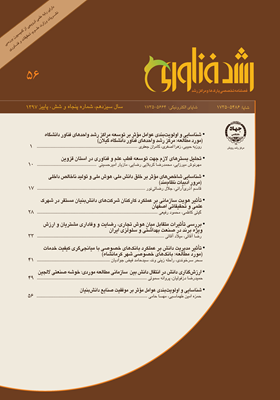تأثیر هویتسازمانی بر عملکرد کارکنان شرکتهای دانشبنیان مستقر در شهرک علمی و تحقیقاتی اصفهان
محورهای موضوعی : پارکهاي علم و فناوري و مراکز رشد
1 -
2 - عضو هیئت علمی پژوهشگاه فضایی ایران
کلید واژه: هویت هویتسازمانی عملکرد عملکرد کارکنان شرکتهای دانشبنیان,
چکیده مقاله :
امروزه شرکتهای دانشبنیان بهعنوان گزینهای کلیدی برای تولید در کشورها، وظیفه تبین و مدلسازی فرایندهای تحقیق و توسعه را بر عهده دارند. توسعه کسب و کار نیاز به مهارتهای خاص دارد و با توجه به محیط رقابتی و جدیدبودن موضوع دانشبنیان بودن در کشور، این امر این شرکتها را وا میدارد که به توسعه محصولات و خدمات خود فکر کنند. در این خصوص استفاده از هویت سازمانی که بهعنوان یک ابزار راهبردی سازمان میباشد. تأثیر بهسزایی در هویت بخشی به محصول و خدمات و ارائه بهتر آنها به مشتریان دارد. هویت به شرکت کمک میکند تا سطح عملکرد و بهرهوری خود را افزایش دهد. پژوهش حاضر با هدف بررسی تعیین تأثیر هویتسازمانی بر عملکرد کارکنان شرکتهای دانشبنیان مستقر در شهرک علمی و تحقيقاتی اصفهان انجام شد. جامعه آماری این تحقیق شامل 850 نفر از کارکنان شرکتهای دانشبنیان مستقر در شهرک علمی و تحقیقاتی اصفهان بود که با استفاده از فرمول کوکران تعداد 350 نفر به روش تصادفی ساده بهعنوان نمونه آماري انتخاب شدند. این تحقیق به روش توصیفی از نوع همبستگی انجام شد. پس از جمعآوری دادهها، تجزیه و تحلیل آنها در دو سطح توصیفی و استنباطی انجام شد. در سطح توصیفی مشخصههای آماری نظیر فراوانی، درصد، میانگین، انحرافمعیار و در سطح استنباطی متناسب با سطح دادهها و فرضیهها، آزمونهای آماری معادلات ساختاری مورد استفاده قرار گرفت. نتایج نشان داد بهطور کلی تأثیر هویت سازمانی بر عملکرد کارکنان شرکتهای مستقر در شهرک علمی و تحقیقاتی اصفهان معنادار و مثبت است.
Today, knowledge-based companies are considered as key elements for domestic production in countries, and also they have responsibility for R & D modeling processing as well; Business development needs special skills and concerning the competitive environment and new idea of being k-based in the country, the companies have to develop their services and productions. Considering corporate identity as a strategic tool, it can affect greatly the identity of products and services and also offering them to the customers. Corporate identity help company enhance its efficiency and performance. This study was conducted with the aim to examine the effects of corporate identity on the functionality of Knowledge-based companies settled at Isfahan Science and Technology Town (ISTT). A descriptive correlation approach was used for this purpose. The statistical population contains 345 randomly chosen individuals attained by the use of Cochran’s formula from 850 personnel from knowledge-based companies settled at ISTT. In this study, Corporate Identity and Hersey and Goldsmith (1990) questionnaires were used that incorporated 42 items with 7 dimensions. Content validity was confirmed by the study supervisor and related experts in this field, and the formal validity was confirmed by several persons in the statistical population. The reliability of the questionnaire was tested by Cronbach's alpha coefficient yielding 0/818 for corporate identity and 0/881 for its functionality. The obtained result indicates that the questionnaire is reliable. A descriptive and inferential analysis was then applied to the collected data. The descriptive analysis included examination of obtained statistical properties including frequency, percentage, average, and standard deviation. The inferential analysis included statistical tests which were carried out for the structural equations used in proportion to their amount of data and hypothesizes.The results indicated that there exists a meaningful and positive correlation between corporate identity and the functionality of Knowledge-based companies settled at Isfahan Science and Technology Town (ISTT).
1- براتی، هاجر، عریضی، حمیدرضا، نوری، ابوالقاسم، رابطه ساده و چندگانه عدالت سازمانی با عملکرد شغلی در شرکت ذوبآهن، اصفهان، چشمانداز مدیریت، شماره 33، صفحات 28-9، 1396.
2- رفیعزاده، علی، مدیریت عملکرد و توسعهیافتگی سازمانها (مطالعه موردی و تجربه عملی). سومین کنفرانس ملی مدیریت عملکرد، دانشکده مدیریت دانشگاه تهران، تهران. 1386.
3- www. eekhtiyari.ir{1}
4- Brown M.E. 1969. Identification and some conditions of organizational involvement. Administrative science quarterly, 14, 355.
5- Prevos P.2004.Cultural identity. Sydney: Foundation of social science (Maquarie University).
6- Balmer, John M.T. and Edmund R. Gray. 2003. “Commentary Corporate Brand: what are they? What of Them?” European Journal of Marketing, 37(7,8): 972-997.
7- Hatch M.J, and Schul M. Relations between organizational culture, identity and image. 1997 European Journal of Marketing, 31:356-365.
8- Journal,12:443-458
9- Ashforth B, and. Mael F.. Social Identity Theory and the Organization. The Academy of Management Review,1989pp. 14: 20-39.
10- Guatam T. Van Dick R and Wagner U. Organizational identification and organizational commitment: Distinct aspects of two related concepts. Asian journal of social Psychology.2004،pp 7: 301-315.
11- Witing M. Relations between organizational identity, identification and organizational objectives. Journal of management psychology. 2006، pp14:432-452.
12- Pratt M.G., Rockman K and kaufman J. “Constructing Professional Identity: the role of work and identity learning cycle in the Customization of identity among Medical professionals.` Academy of Management Journal 2006, pp49: 235-62.


